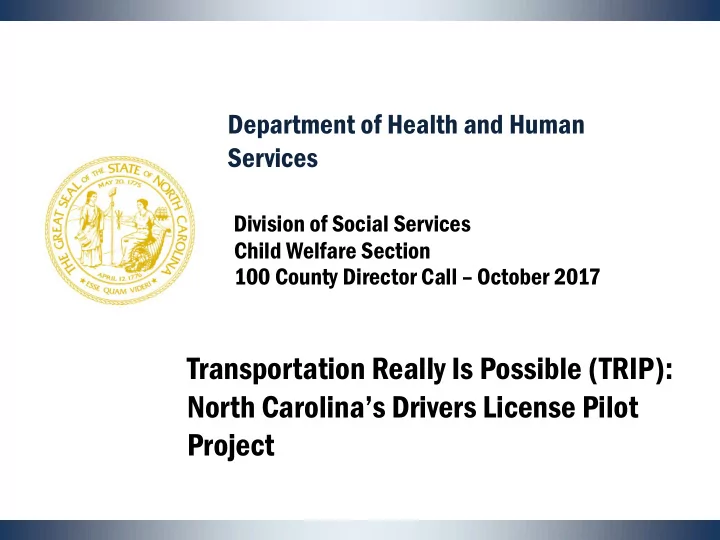

Department of Health and Human Services Division of Social Services Child Welfare Section 100 County Director Call – October 2017 Transportation Really Is Possible (TRIP): North Carolina’s Drivers License Pilot Project
Transportation Really Is Possible (TRIP) • What is TRIP? −Transportation Really Is Possible or “TRIP” is the program developed by the NC Division of Social Services, county child welfare agencies, foster youth, family partners, and other stakeholders in response to Session Law 2017-41 (H630), which directed the Division to create a two-year pilot program to reimburse youth and caregivers on a first-come, first- served basis for driving-related expenses.
TRIP Project Status • A small group of NC DSS staff, county staff with experience in LINKS and working with foster youth, foster youth (SaySo), family partners, and other stakeholders have held conference calls between September and October to develop program criteria. • Criteria development includes determining eligible costs and eligibility criteria of young people and/or caregivers to participate. • The group has also developed tools to assist in assessing youth readiness. • On Friday, October 27 the group will hold a conference call to refine the criteria, develop criteria related to required documentation, and plan for the development of educational and promotional materials. 3
TRIP: DRAFT Eligible Costs • Driver’s Education • Permit and License Fees • Insurance • Other Costs Associated − Inspection − Registration − Property Taxes − Incentives for Caregivers − Vehicle History Reports − Additional Fees
TRIP: DRAFT Eligibility Criteria for Young People • At least 14 ½ years old; and, • In foster care per G.S. 131D-10.2(9); or • Participating in Foster Care 18 to 21; and, • Have obtained approval of caregiver/agency, as needed; • Have one or more goal on DSS-5026a Transitional Living Plan detailing steps/responsibilities; and, • Have a written agreement with agency and caregiver regarding their plans to contribute to ongoing driving costs, educational criteria, and caregiver’s agreement to support the young person gaining driving experience.
TRIP: DRAFT Eligibility Criteria for Caregivers • Are providing care for a youth in foster care per G.S. 131D-10.2(9); or, • Are providing placement for a young adult participating in Foster Care 18 to 21; and, • Have applied the reasonable and prudent parent standard, as appropriate; • Have contacted the agency to obtain information, referral, or any other approval needed; and, • Have a written agreement with the young person and the agency regarding the young person’s plans to contribute to ongoing driving costs, educational criteria, and caregiver’s agreement to support the young person in gaining driving experience.
Next Steps • Develop plan for dissemination of program information and training; • Finalize criteria with group and route for review and approval of NC DSS leadership; • Finalize and publish/disseminate necessary forms to counties (reimbursement request forms, readiness assessment, etc.); • Publish all program criteria and forms, announce when counties may begin submitting reimbursement requests, and implement dissemination/training plan.
8 Questions and Feedback Division of Social Services Child Welfare Section Erin Conner, MSW (919) 527-6351 Erin.Conner@dhhs.nc.gov
Recommend
More recommend